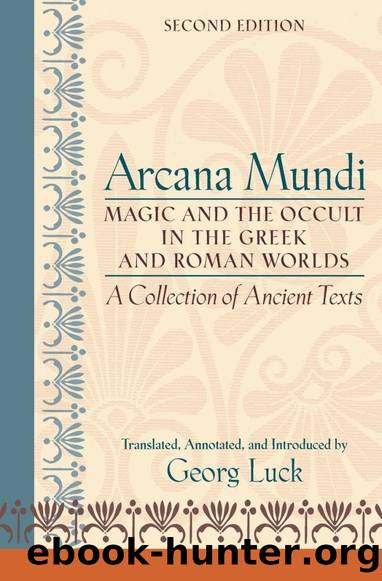Arcana Mundi: Magic and the Occult in the Greek and Roman Worlds by Georg Luck

Author:Georg Luck [Luck, Georg]
Language: eng
Format: epub
ISBN: 9780801883460
Google: g7EKsAdHdL4C
Barnesnoble:
Published: 2007-04-04T15:17:04+00:00
o
IV
DIVINATION
This page intentionally left blank
Introduction
o
Foretelling the future, interpreting the past, and, in general, discovering hidden truth (by way of clairvoyance, precognition, telepathy, and other such phenomena) was called divinatio by the Romans. The noun is derived from the verb divinare âto predictâ, which is no doubt related to divinus âdivineâ in the sense of ââpertaining to a god or to the gods.ââ The linguistic evidence in antiquity shows that the gift of predicting future events or grasping things by extrasensory perception was something that came from the gods, and this is confirmed by myth. According to Aeschylus ( Ag. 1203â.), Cassandra had been given her prophetic powers by Apollo to win her love. Similarly, Tiresias was endowed with the gift of prophecy, either by Zeus or by Athena, to compensate him for the curse that had made him blind.
The Greek word for ââprophetic powerââ or ââgift of divinationââ is manteia; the word for ââprophetââ or ââprophetessââ is mantis. The Greeks were probably right in connecting these two words with mainomai âto be madâ and mania âmadnessâ, but of course they were not thinking of permanent insanity; rather, they meant an abnormal state of mind that lasted for a short time. The word ekstasis also is used to describe this abnormal state; it means ââstepping out of oneâs self ââ and is best understood today as
ââtrance,ââ though in antiquity it could mean a form of ââpossession.ââ The association of prophetic powers with ââmadnessââ seems to be a very old idea among the Indo-European tribes, as the etymology shows, â and the descriptions of prophetic trance [ nos. 87 and 90] stress this particular aspect. It should be said, however, that this is only one form of divination; there are forms (e.g., the interpretation of dreams, or astrological forecasts) that do not requireâin fact, they precludeâan abnormal state of consciousness.
Something should be said about the original meaning of the words prophet, prophecy, and the like. In Greek, prophetes literally means ââa person who speaks for someone else,ââ and that someone else is usually a god, 285
Arcana Mundi
though in Delphi the priests who interpreted the obscure utterances of the Pythia were also called prophetai. The Pythia was the mantis, directly inspired by Apollo, but her message from the god had to be put into comprehensible form, into verse, for those who consulted the oracle.
These prophetai were not directly in touch with the god; they were one step removed. Plato ( Timaeus 72A) says that the term prophetes should be reserved for those priestly interpreters who translated the frenzied utterances of the ecstatic seer ( mantis) into intelligible Greek. But, in general, prophetes is a person who speaks for a god, or through whom a god speaks and reveals his plans. This is true for the prophets of the Old Testament, for John the Baptist, for Jesusâfor anyone who proclaims a divine message with a special sense of mission.
Divination had its roots in Mesopotamia. The gift of prophecy and the status it confers were taken for granted in the Old Testament.
Download
This site does not store any files on its server. We only index and link to content provided by other sites. Please contact the content providers to delete copyright contents if any and email us, we'll remove relevant links or contents immediately.
The Daily Stoic by Holiday Ryan & Hanselman Stephen(3301)
The Fate of Rome: Climate, Disease, and the End of an Empire (The Princeton History of the Ancient World) by Kyle Harper(3055)
People of the Earth: An Introduction to World Prehistory by Dr. Brian Fagan & Nadia Durrani(2732)
Ancient Worlds by Michael Scott(2682)
Babylon's Ark by Lawrence Anthony(2673)
The Daily Stoic by Ryan Holiday & Stephen Hanselman(2569)
Foreign Devils on the Silk Road: The Search for the Lost Treasures of Central Asia by Peter Hopkirk(2456)
India's Ancient Past by R.S. Sharma(2451)
MOSES THE EGYPTIAN by Jan Assmann(2412)
The Complete Dead Sea Scrolls in English (7th Edition) (Penguin Classics) by Geza Vermes(2277)
The Earth Chronicles Handbook by Zecharia Sitchin(2226)
Lost Technologies of Ancient Egypt by Christopher Dunn(2223)
24 Hours in Ancient Rome by Philip Matyszak(2078)
Alexander the Great by Philip Freeman(2064)
Aztec by Gary Jennings(2022)
The Nine Waves of Creation by Carl Johan Calleman(1915)
Curse Tablets and Binding Spells from the Ancient World by Gager John G.;(1860)
Before Atlantis by Frank Joseph(1849)
Earthmare: The Lost Book of Wars by Cergat(1823)
